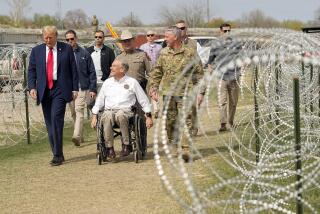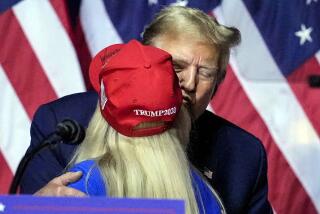Republican Gary Johnson is not the average presidential candidate
As campaign stops for Republican presidential candidates go, the International Drug Policy Reform Conference in downtown Los Angeles seemed like a strange choice.
There was reggae music booming from big speakers, lapel pins shaped like marijuana leaves and a speech by California Lt. Gov. Gavin Newsom, the liberal former mayor of San Francisco who is famous for granting marriage licenses to same-sex couples.
And yet there Gary Johnson stood this month, drawing cheers from a crowd of drug decriminalization activists.
Johnson, the former governor of New Mexico, has promised that if he wins the Republican nomination and is elected president, he’ll issue a pardon for anyone serving prison time for a nonviolent marijuana crime. He has also pledged to overhaul the tax system and cut federal spending by 43%.
What Johnson’s shoestring presidential campaign lacks in resources and media attention — which is a lot — it has made up for in eccentricities. Consider last month, when the candidate showed up to talk economics with protesters at Occupy Wall Street. Or his recent 458-mile barnstorming tour of New Hampshire — on a bicycle.
In October, Johnson rented a house in Manchester and decided to focus his campaign efforts entirely on New Hampshire, where he hopes his candid style and libertarian leanings will appeal to Republican primary voters famous for their independent streak.
“My entire career, everything has always been different,” said Johnson, a former building contractor and self-made millionaire who won the governorship in 1994 with no previous political experience. “And isn’t that what people want these days? Something different?”
But seven months into his campaign, Johnson has yet to climb higher than 3% in polls of voters’ preference for Republican primary candidates. He has been left out of most of them, and he has been excluded from all but two of the televised Republican debates. That has made an imposing challenge out of fundraising and expanding his name recognition beyond his small but ardent core of supporters.
“I’m basically a non-entity,” he said.
Hurting his cause may be competition from another more established small-government Republican with libertarian allure, Rep. Ron Paul (R-Texas).
Johnson campaign advisor Jeffrey Miron, a Harvard University economist, said poll data suggested that in the Republican field, “there may not be room for more than one libertarian candidate.”
That is disheartening to Johnson, who says the leading GOP contenders are “too status quo,” and that his exclusion from the debates means voters won’t hear the full spectrum of Republican opinion.
Johnson is 58, with a boyish haircut and a deep tan. According to a shirtless photograph of him that appeared in GQ Magazine recently, he also has washboard abs.
A triathlete who has scaled some of the world’s tallest mountains, including Mt. Everest, Johnson admits that he finds the modern campaign process “unsavory.” He half-jokingly suggests campaign reforms that would force candidates to wear NASCAR-style jackets covered with the logos of all of their corporate sponsors.
So, why is a man so down on politics running for president? It’s simple, Johnson said: “I’m outraged.”
On this afternoon, targets of his wrath included the federal government’s Wall Street bailouts, the “money and energy wasted on the drug war,” and the $47 daily parking fees at the Westin Bonaventure, where the conference was held. While governor, Johnson earned a reputation as a tightwad for using his veto power liberally to line-edit the state budget.
He empathizes with the Occupy Wall Street movement, whose message, he says, is also “outrage.”
So after his speech, and once he had finished talking to several marijuana-focused media outlets, he walked several blocks to City Hall, home to Occupy Los Angeles and its sprawling encampment of tents.
Many of the protesters, a group of whom were throwing a football, didn’t notice the presidential candidate in their midst. Johnson didn’t seem to mind. He cheerfully approached strangers, asking one, “What’s your protest?”
Johnson’s schedule these days is typically packed back-to-back with town halls, interviews and fundraising functions, but he seems more at ease simply chatting with people.
He was several minutes into a conversation with an older protester when the man asked him, “What do you do, sir?”
“I am running for president of the United States,” Johnson replied.
“Oh,” the man said. “Do you have a card?”
“No,” Johnson replied sheepishly, fishing in his pockets. “No, I don’t.”
A younger man approached with a group of friends and said, “Hey, you’re the governor that smoked weed, aren’t you?”
Johnson has been calling for the legalization of the drug since the beginning of his second term as governor, in 1999. He believes decriminalization would save the government billions of dollars in enforcement and would help end violence on the U.S. border with Mexico.
He smoked marijuana recreationally when he was younger and used it more recently to help with pain after a 2005 paragliding accident. Nationally, he says, he is still known as “the marijuana guy.” But he wants to be more than that.
Johnson is considering a run in 2016 if he doesn’t win the nomination next year.
Johnson seemed pleasantly surprised when another protester, Steve Fornick, walked up and handed him a cellphone. Say hello to my friend, Fornick said, she’s a big supporter of yours.
“This is Gary Johnson,” he said into the phone.
“Yep,” he said. “I’m down here at Occupy L.A.”
He laughed.
“I’m impressed that you know who this is.”
More to Read
Start your day right
Sign up for Essential California for news, features and recommendations from the L.A. Times and beyond in your inbox six days a week.
You may occasionally receive promotional content from the Los Angeles Times.







